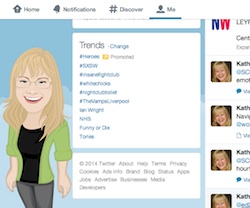Recommended Resources
Great ideas for using Twitter for your CPD

Twitter and your CPD
As time goes on I’m finding more and more that I’m turning to Twitter for my CPD for the latest news, reviews, reports and information.
Twitter has 6 distinct advantages over traditional ‘Googling’ or checking websites obsessively:
1. When a link is posted on Twitter, it is very easy to ‘click through’ to exactly the right landing page, without having to waste time trawling through the website, looking for right article or review. This is especially true of some sites with less than efficient search facilities (DfE).
2. For breaking news there is instant access to news sites, magazines and newspapers. By entering the search term, you can find all the news in that area, from pupil premiums to Sure Start Children’s Centres.
3. Twitter is a great place to find out about access to free material. For example, some publishers allow access to journals for a month or journals linked to a current issue, such as International Woman’s Day. There is even a librarian, David Renfree (@UCBChildEd), who regularly Tweets about different theorists (with loads of interesting links) in 140 characters.
4. Twitter is a really easy way to to alert friends about items of interest by simply ReTweeting the link.
5. You can search for areas of interest, for example, autism. There are some fantastic support groups, all over the world, who can be contacted to find out more information and latest good practice.
6. Use of the Hashtag (#) discussions. I have to admit that I am a relative novice at this, but my favourite is #EYTalking, Tuesday night 8pm to 9pm (GMT), run by Laura Henry via @EYTalking. This has previously had a DfE representative and Lucy Powell (@LucyMPowell, Labour MP Manchester Central) on, answering questions. We were able to ask exactly the questions we wanted answered, with some very revealing responses. You can’t ramble or avoid the question in 140 characters!
To help you choose some people to follow, here are some of my recommendations:
Good for interesting articles, links to theory and generally good stuff:
- David Renfree at University College, Birmingham (@UCBChildEd) – theorists in 140 characters, videos, reviews
- Laura Henry (@LauraChildcare)
- The King’s Fund (@TheKingsFund) – health, social care
- Sutton Trust (@suttontrust) – social mobility and education
Up to date news:
- Nursery World (@NurseryWorld)
- Children and Young People Now CYPNow (@cypnow)
- BBC Education (@BBCEducation)
Most of the national newspapers also have a Twitter feed, some with specific education sites. Choose the ones you like the look of!
Latest reviews, research, reports – particularly good for students of all sorts:
- 4ChildrenUK (@4ChildrenUK)
- ncb – national children’s bureau (@ncbtweets)
- the Department for Education DfE (@educationgovuk)
and finally, free access to journals and peer reviewed works:
- Taylor and Francis group (@Tandfauthorserv)
- Sage (@SAGEsociology)
- Palgrave Journals (@PalgraveJournals)
- Routledge Sociology (@Routledge_socio)
It can be incredibly daunting once you realise how many millions of Twitter accounts that you could possibly follow.
But don’t let that put you off.
You can quickly keep track of all your Twitter friends, by keeping a list of each different interest area, such as news, interesting Tweeters or specialist areas (autism, SEN, literacy etc.). You can check up on these, as and when you have time or the need to do research.
Let me know if you have any favourites I have missed out here.
Happy Tweeting!
Kathy Brodie
https://www.kathybrodie.com/author/kathy-brodie/Kathy Brodie is an author, Early Years Professional and Trainer specialising in online training and courses. She is the founder and host of the Early Years Summit and Early Years TV, weekly Professional Development for Early Years practitioners and educators.
